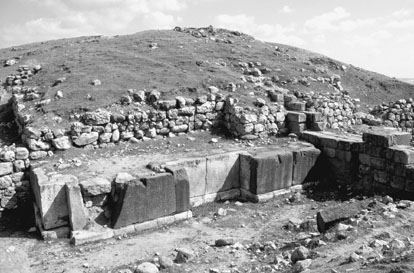

 | Page 1252 |  |
in character. The foreign institutes may become largely research facilities and centers for liaison with in-country archaeologists, who will control most of the fundamental data.

Ebla, ancient city of northern Syria, discovered in 1968 by the Italian archaeologist Paolo Matthiae at Tell Mardikh. The city dates back to 2500–2200 B.C.
(Charles & Josette Lenars/Corbis)
The situation envisaged raises the question of whether Syro-Palestinian archaeology, for all its declarations of independence, will be able to survive as an autonomous academic and professional discipline anywhere outside the Middle East. Full-time positions in European and North American universities and museums are already scarce, and as the older generation retires and academic cutbacks take effect, a severe vocational crisis is likely to arise. The simple fact is that Syro-Palestinian archaeology has enormous popular appeal in the West but that appeal is still based too often on the public’s fascination with things biblical. It does not translate into the kind of support that the discipline needs to survive as a scholarly enterprise. Amateur archaeology may be commendable, but it must be matched by a professional field that is adequately supported and able to reproduce itself.
Although the future for the Middle East schools seems bright, the progress of archaeology throughout the region continues to be threatened by political fragmentation and instability. The severe economic hardships are typical of developing countries everywhere, and modern expansion and industrialization destroy thousands of antiquities sites annually, many of which have never even been mapped. An additional danger is posed by rampant nationalism, which may result in excessive enthusiasm for archaeology, or religious extremism, which may resist any scientific investigation of the past. Both abuses of archaeology are already evident in the Middle East.
Finally, we must again consider theory, which is not merely epiphenomenal or trivial, as some people think. It is a body of theory, whether subconscious or deliberate, that guides fieldwork and research and that ultimately determines results. The theory of the “new” or “processual” archaeology of the 1970s and 1980s is drawn from both anthropology and the philosophy of science, and it emphasizes explaining universal “laws” of the cultural process. By the early
 |  |